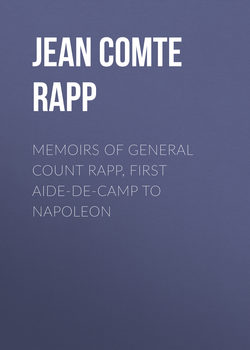Читать книгу Memoirs of General Count Rapp, First aide-de-camp to Napoleon - Jean Comte Rapp - Страница 2
CHAPTER II
ОглавлениеMany persons have described Napoleon as a violent, harsh, and passionate man; this is because they have not known him. Absorbed as he was in important business, opposed in his views, and impeded in his plans, it was certainly natural that he should sometimes evince impatience and inequality of temper. His natural kindness and generosity soon subdued his irritation; but it must be observed that, far from seeking to appease him, his confidents never failed to excite his anger. "Your Majesty is right," they would say, "such a one deserves to be shot or broken, dismissed or disgraced: I have long known him to be your enemy. An example must be made; it is necessary for the maintenance of tranquillity."
If the matter in question had been to levy contributions on the enemy's territory, Napoleon, perhaps, would demand twenty millions; but he would be advised to exact ten millions more. He would be told by those about him, "it is necessary that your Majesty should spare your treasury, that you should maintain your troops at the expense of foreign countries, or leave them to subsist on the territory of the confederation."
If he entertained the idea of levying 200,000 conscripts, he was persuaded to demand 300,000. If he proposed to pay a creditor whose right was unquestionable, doubts were started respecting the legality of the debt. The amount claimed was perhaps reduced to one half, or one third; and it not unfrequently happened that the debt was denied altogether.
If he spoke of commencing war, the bold resolution was applauded. It was said war enriched France; that it was necessary to astonish the world, and to astonish it in a way worthy of the great nation.
Thus, by being excited and urged to enter upon uncertain plans and enterprises, Napoleon was plunged into continual war. Thus it was, that his reign was impressed with an air of violence contrary to his own character and habits, which were perfectly gentle.
Never was there a man more inclined to indulgence, or more ready to listen to the voice of humanity: of this I could mention a thousand examples; but I confine myself to the following.
Georges and his accomplices had been condemned. Josephine interceded for M.M. Polignac, and Murat for M. de Rivière, and both succeeded in their mediation. On the day of execution, the banker Scherer hastened to Saint-Cloud, bathed in tears, and asked to speak with me. He begged of me to solicit the pardon of his brother-in-law, M. de Russillon, an old Swiss Major, who had been implicated in the affair. He was accompanied by some of his countrymen, all relatives of the prisoner. They observed that they were conscious the Major merited his sentence; but that he was the father of a family, and that he was allied to the most distinguished houses in the Canton of Bern. I yielded to their entreaties, and I had no reason to regret having done so.
It was seven in the morning. Napoleon was up and in his closet with Corvisart, when I was announced. "Sire," said I, "it is not long since your Majesty settled the government of Switzerland by your mediation. But you know that the people are not all equally satisfied; the inhabitants of Bern in particular. You have now an opportunity of proving to them your magnanimity and generosity. One of their countrymen is to be executed this day. He is connected with the best families in the country; if you grant his pardon it will certainly produce a great sensation, and procure you many friends."—"Who is this man? What is his name?" inquired Napoleon.—"Russillon," I replied. On hearing this name, he became angry.—"Russillon," said he, "is more guilty than Georges himself."—"I am fully aware of all that your Majesty now does me the honour to tell me; but the people of Switzerland, his family, his children, will bless you. Pardon him, not on his own account, but for the sake of the many brave men who have suffered for his folly."—"Hark ye," said he, turning to Corvisart, while he took the petition from my hand, approved it, and hastily returned it to me; "immediately despatch a courier to suspend the execution." The joy of the family may be easily guessed: to me they testified their gratitude through the medium of the public papers. Russillon was imprisoned along with his accomplices; but he afterwards obtained his liberty. Since the return of the King, he has several times visited Paris, though I have not seen him. He thinks that I attached but little importance to the act of service I rendered him; and he is right.
